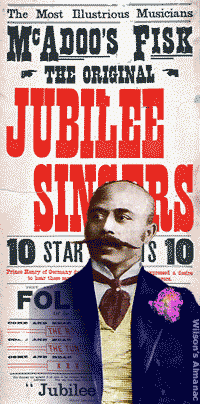'Wimoweh' song and Orpheus McAdoo


1900 Death in Sydney, Australia of Orpheus Myron McAdoo (Bill McAdoo; b. 1858), African-American 'black minstrel' singer who toured Europe, South Africa and Australia with McAdoo's American Minstrels and McAdoo's Alabama Cakewalkers.
In 1876 McAdoo graduated from Hampton Normal and Agricultural Institute (founded in 1868 at Hampton, Virginia by Northern philanthropists, notably General Samuel Chapman Armstrong) and taught in Virginia schools before returning to teach at his alma mater. In 1881 he took the place of his fellow student, African American educator and author Booker T Washington (1856 - 1915), in charge of the Native American boy students' dormitory.
Before commencing his own theatrical company in 1890 (mostly composed of fellow Hampton graduates - see Booker T Washington's papers), he had been one of the troupe of the eminent bass singer Frederick J Loudin and the Fisk Jubilee Singers, who first arrived in Australia at Melbourne on May 14, 1886. The Fisk style of music included cakewalks and spirituals ...
Like his Sydney contemporaries Henry Lawson, Henry Kendall, Dorothea Mackellar, JF Archibald and Victor Daley and numerous other Australian celebrities, McAdoo's grave is in Waverley Cemetery at Bronte, a suburb of Sydney ...
McAdoo, Solomon Linda and 'The Lion Sleeps Tonight'
Before McAdoo's death the McAdoo Jubilee Singers had extensive tours in South Africa until hostilities began in the Boer War. McAdoo was shocked by the racism he saw and wrote to the Hampton Institute:
"There is no country in the world where prejudice is so strong as here in Africa. The native today is treated as badly as ever the slave was treated in Georgia. Here in Africa the native laws are most unjust; such as the Christian people would be ashamed of. Do you credit a law in a civilized community compelling every man of dark skin, even though he is a citizen of another country to be in his house by 9 o' clock at night, or he is arrested? Before I go into parts of Africa, I had to get a passport and a special letter from the governors and presidents of the transvall [sic] and the Orange Free States, or we would have all been arrested. Black people who are seen out after 9 o' clock must have passes from their masters, indeed, it is so strict that natives have to get passes for day travel…. I met a few colored men, Americans, living here. One opened a business in Johannesburg and before he could open, he had to get a white man to allow him to use his name, because no Negro is allowed to have his own business."
Many indigenous Africans were no doubt influenced and inspired by the visitors as role model, as they had not long ago been slaves themselves. Orpheus Myron McAdoo's legacy in Africa and the world is far reaching for in the 1890s it was his singers who popularised African American spirituals in South Africa through their widespread touring – two separate tours totalling eight years.
McAdoo's syncopations and American styles reached deep into South Africa, in mining towns and bush villages. It reached as far as Gordon Memorial School, above a valley called Msinga, in Zulu country about 300 miles southeast of Johannesburg. A generation later, the sounds influenced a pupil of that school, Solomon Linda, who formed a group called Solomon Linda and the Evening Birds.
Solomon Linda wrote a song called 'Mbube', Zulu for 'the lion', and recorded it in the Evening Birds' second session, in Johannesburg in 1939 after they had been 'discovered' by a talent scout. The song's lyrics told the tale of a group of men hunting a sleeping lion; the song was a South African hit, selling about 100,000 copies during the 1940s. Pete Seeger, the American folk musician, heard the compelling song in 1949 ...
[Today in the BoD we have an hilarious animated version of the 'Wimoweh' song, featuring a hippo and a dog.]
Categories: australia, usa, biography, history, australian-history, music







0 Comments:
Post a Comment
<< Home